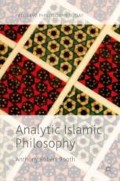Abstract
In this chapter we introduce the thought of al-Kindi—almost unanimously taken to be the first of the great Falasifa—and present him as a successful salesperson for Falsafa in the Muslim world. Even if his arguments are not all entirely successful, they are all ingenious. We present his thought as unified under the banner of what we call Evidentialism—a thesis that later became an axiom of the Enlightenment and, which, along with his take on Greek philosophy set the rough contours of, and opened a fertile intellectual terrain to, the ensuing tradition of Falsafa.
Notes
- 1.
The “rightly guided” Caliphs are those four or three who immediately followed Muhammad, and were either close companions of his, or his genetic descendants. Here, of course, is where the split between Sunni and Shiite Islam occurs—the former acknowledging the Prophet’s nephew ‘Ali as a legitimate Caliph, and maintaining that the Caliphate should have been hereditary in the first instance (‘Ali the only hereditary candidate was not immediately installed as Caliph), while the Sunnis deny this.
- 2.
For an account of why this might have been politically expedient, see Gutas (1998).
- 3.
Incidentally, we do not know the chronology of al-Kindi’s works. All we have of his works are collected in one single manuscript discovered by Helmut Ritter and which is now held in Istanbul. We know that he wrote other works from a contemporary book-merchant’s book list, but again we do not know the chronology of them.
- 4.
- 5.
I take the coffee example from Linda Zagzebski (2003).
- 6.
Though recall the controversy as to what exactly Aristotle meant by “substance”.
- 7.
Time, according to Aristotle in the Physics, enumerates motion and so change.
References
Secondary Sources
Adamson, P. 2007a. Al-Kindī. Oxford University Press.
———. 2007b. Knowledge of Universals and Particulars in the Baghdad School. Documenti e Studi Sulla Tradizione Filosofica Medievele 18: 141–161.
Antognazza, M.R. 2015. The Benefit to Philosophy of the Study of Its History. British Journal for the History of Philosophy 23 (1): 161–184.
Bonjour, L. 1986. Empirical Knowledge. Rowman and Littlefield.
Clifford, W.K. 1877[1999]. The Ethics of Belief. In The Ethics of Belief and Other Essays, ed. T. Madigan. Prometheus.
Gettier, E. 1963. Is Knowledge Justified True Belief. Analysis 23 (6): 121–123.
Gutas, D. 1998. Greek Thought, Arabic Culture: The Graeco-Arabic Translation Movement in Baghdad and Early Society. Routledge.
Nasr, S.H. 2006. Islamic Philosophy from Its Origin to the Present: Philosophy in the Land of Prophecy. SUNY.
Swinburne, R. 1981. Faith and Reason. Oxford University Press.
Zagzebski, L. 2003. The Search for the Source of Epistemic Good. Metaphilosophy 34: 12–28.
Author information
Authors and Affiliations
Copyright information
© 2017 The Author(s)
About this chapter
Cite this chapter
Booth, A.R. (2017). Al-Kindi and the Rise of Falsafa. In: Analytic Islamic Philosophy. Palgrave Philosophy Today. Palgrave Macmillan, London. https://doi.org/10.1057/978-1-137-54157-4_3
Download citation
DOI: https://doi.org/10.1057/978-1-137-54157-4_3
Published:
Publisher Name: Palgrave Macmillan, London
Print ISBN: 978-1-137-54156-7
Online ISBN: 978-1-137-54157-4
eBook Packages: Religion and PhilosophyPhilosophy and Religion (R0)

